The Secrets of Thoth and
The Keys of Enoch
Reports of giant statues and kilometre-wide underground lake found beneath the Giza plateau have proven inaccurate. The system of underground tombs which has been investigated do involve negotiation of waterways but do not contain any statues, only coffins and vaults. The mention of giant statues actually relates to the Ramses tomb in the Valley Of The Kings (K5), not
the tombs of Giza. Remote sensing conducted in 1978 was not in the area of Giza but the "radar
rivers" along the Sudan-Egyptian border, the work was not classified but well reported.
The work of Dr James Hurtak is referenced in the article but, the terminology and home-spun speculation about such things as the "fourth root race", the "gods of Egypt", the true age of the Giza structures or the nature of ancient technology are those of the writer and certainly not the
beliefs or world view of Dr Hurtak, who is more concerned with serious archeological research.
The ideas and information presented reflect a wide range of sources, including those immediately cited in the article, such as the work of Graham Hancock, Peter Lemesurier, Robert Bauval, David Childress and Zecharia Sitchen.
Paul White. October '99
The Secrets of Thoth and
The Keys of Enoch
By Paul WhiteJust after the Deluge, at the dawn of the present time cycle,an era the Egyptians called ZEP TEPI, "The First Times",a mysterious group of "gods" appeared, to initiate thesurvivors in the rudiments of civilisation. From Thoth and Osirisin Egypt, to Quetzacoatal and Viracocha in the Americas, traditionsworldwide subscribe the origins of contemporary civilisation tothis sophisticated group.
Despite the misleading popularity of Von Danikan journalism,evidence from around the world, indicates these people were thehi-tech survivors of the previous civilisation. Like the nuclearsurvival bunkers and secret research facilities of our own civilisation,there were those who arose from the underground "cities ofthe Gods", after the dust settled. They were the "prediluvianpatriarchs", like Enoch and Methuselah, the "giantsand heroes of old", mentioned in Genesis. The enigmatic godsof ancient Summer, Egypt and India, all hail from the fabuloustimes before the Flood.
Since the declassification of the new ground-penetrating radar2 years ago, the most staggering data has emerged of complex andlabyrinthine underground systems in various parts of the world.At places like Guatemala in the South Americas, tunnels have beenmapped under the Mayan pyramid complex at Tikal, which extenda full 800 kilometres to the opposite side of the country. Investigatorsremarked, it was possible to understand how half a million MayanIndians escaped the decimation of their culture.
In similar fashion, the SIRA radar was deployed in Egypt asearly as 1978, mapping an extraordinary subterranean complex beneaththe Egyptian pyramids. Arrangements made with President Sadatof Egypt, resulted in three decades of top secret excavationsto penetrate the system. At a recent meeting in Australia, oneof the key scientists on the Giza project, Dr. Jim Hurtak, showedfilm footage of work in progress called, CHAMBERS OF THE DEEP,due to be released at the end of the century.
The film reveals the discovery of a vast megalithic metropolis,15,000 years old, reaching several levels below the Giza plateau.While the rest of the Nu-Age speculates about a hidden chamberunder the left paw of the Sphinx, the legendary "City OfThe Gods", lays sprawled beneath. Complete with hydraulicunderground waterways, the film shows massive chambers, the proportionsof our largest cathedrals, with enormous statues, the size ofthe Valley of the Nile, carved in-situ. Researchers, risking theirlives with lights and cameras, carefully negotiated rubber dinghiesacross subterranean rivers and kilometer-wide lakes, to penetratesealed chambers beyond. Already, remarkable caches of recordsand artifacts have been found.
It is the legacy of a civilisation and a technology way beyondour own. A technology capable of creating a vast underground city,of which the sphinx and pyramids are merely the surface markers.The project scientist, Dr. Hurtak, likens it to the impact ofcontact with an advanced extraterrestrial culture. He describedit as the discovery of the Fourth Root culture, the so-calledAtlantean civilisation, destroyed by the last earth tumble. Itpresents unequivocal evidence that all languages, cultures andreligions trace back to a single common source, which Dr. Hurtakrefers to as the "Parent Civilisation".
The technology unearthed is way beyond machine technology,as we know it. As Arthur C. Clark once joked, "any technologybeyond our own would seem like magic to us." According toDr. Hurtak, this was a culture who cracked the genetic code andpossessed the keys of the physical spectrum, the "HigherLight Physics" of the ancients... everything old Gilgameshwent searching for in his famous trek to the lost "City ofthe Gods" to search the tunnels beneath "Mt. Mashu"in the desert lands.
Hurtak refers to a "language of light" and a greatpriest-scientist of the previous time cycle, named ENOCH, whois associated with the building of the Great Pyramid complex.Hurtak alludes to a grand spiritual science, a science which describesa genetic stairway to the stars.
The priest-scientist ENOCH, is a prediluvian patriarch, oneof the most famous and seminal characters of the previous timecycle. Father of Methuselah and great grandfather of Noah, Enochis credited in the Bible as architect of the original Zion, thelegendary "City of Yahweh", as well as inventor of thealphabet and calendar. Enoch is also history's first astronaut,who "is taken aloft by the Lord" and shown "thesecrets of earth and heaven". He returns to earth with the"weights and measures" for all humankind.
Known to the Egyptians as THOTH, the "Lord of Magic andTime" and to the Greeks as HERMES, "messenger of thegods", he is even remembered in the Celtic tradition as theenigmatic wizard Merlin, who disappears up an apple tree to mythicAvalon, seeking the secret of immortality and vowing to return.
As one who attained immortality, the secret of how we "mightbecome as gods", Thoth/Enoch promises to return at the endof time "with the keys to the gates of the sacred land."In the controversial Dead Sea Scrolls, revealing the lost BooksOf Enoch removed from the Bible by early religious leaders, Enochdescribes a wondrous civilisation in the past, who misused thekeys of higher knowledge and were unable to save themselves fromthe last cataclysm. Both literally and figuratively they lostthe "keys", they lost all higher knowledge.
Yet, Enoch, along with many traditions, even the Mayan legendof Quetzacoatal, promises a return of this knowledge at "Theend of time", the end of the present time cycle. BiblicalRevelations promise "all will be revealed" at the endof the present world. The extraordinary discoveries in Egypt andother parts of the world, describe not just an advanced technologybut, evolutionary path beyond our present state.
Careful scientific examination of the world's key pyramid sites,reveal them to be sophisticated harmonic structures, not onlymirroring positions of the planets and stellar systems but, designedto mimic the chakras and harmonic cavities of the human body.Even each stone within the Great Pyramid is harmonically tunedto a specific frequency or musical tone. The sarcophagus in thecentre of the Great Pyramid is tuned to the frequency of the humanheart beat.
Astonishing experiments, conducted by Dr. Hurtak and colleaguesat the Great Pyramid and other sites in the South Americas, demonstratethe pyramids to be voice-activated "geophysical computers."Intoning specific ancient sounds, the scientific team producedvisible standing waves of light, above and within the pyramidsand were even able to penetrate, hitherto, inaccessible chambers.Subsequent discoveries indicate the ancient priest-scientistsemployed some sort of harmonic sound technology within the templestructures.
The lost Enochian knowledge reveals the mother tongue as a"language of Light". Known to the ancients as HIBURU,it is the primal seed language, introduced at the beginning ofthis time cycle. Modern research confirms, the most ancient formHebrew to be a natural language, the alphabetic forms emergingfrom the phosphene flare patterns of the brain. The same shapes,in fact, born of a spinning vortex. It is a true language of light,coursing through our very nervous system.
Encoding the natural waveform geometries of the physical world,Hiburu is a harmonic language, mimicking the waveform propertiesof light. The "keys" Enoch speaks of, turn out to besound keys, keys to be vibratory matrix of reality itself, themythic "Power of the World". The Enochian knowledgedescribes sonic equations, encoded within the ancient mantrasand god names, capable of directly affect the nervous system andproducing profound effect of healing and higher consciousnessstates.
As the ancient texts declare, "If you would speak withthe gods you must first learn the language of the gods."
DNA, the ancient cabalistic "Tree Of Life" portrayedin the Biblical Torah, is now coming to be viewed as a live vibratingstructure, rather than a fixed tape recording. Many modern scientists,regard DNA as a shimmering, waveform configuration, able to bemodified by light, radiation, magnetic fields or sonic pulses.The legacy of Thoth/Enoch suggests this "language of Light",the harmonic science of the ancients, could actually affect DNA.
The evidence in Egypt, indicates this was the grand 6,000 yeargenetic experiment attempted by the Egyptians, the quest for immortalityand the stars, a quest described by the great ones of old, a questinitiated by Gilgamesh so very long ago. The Egyptians were notfixated on the afterlife, as thought by early Christian translatorsbut, focussed on creating a higher type of human. Along with manyancient cultures, they believed DNA came from the stars and wasdestined to return.
The knowledge of Thoth/Enoch implies humans are meant to evolvebeyond our present terrestrial form, as the Bible tells us, "wemay become greater than angels". The Egyptians record storiesof the "Star Walkers", occasional individuals who, likeEnoch, travelled "beyond the Great Eye of Orion" andreturned, to walk like gods amongst men. Despite the bleachingof semi-divine beings from modern consciousness, could it be possible,as the ancient texts insist, we are destined to "become asgods"? are the Mayan "Lords of Light" and the Egyptian/Tibetan"Shining Ones" really a higher form of human?
According to many earth legends, such beings are supposed toreturn regularly, at the beginning and end of each time cycle,the 13,000 year half-point of our solar system's 26,000 year zodiacalorbit around galaxy centre. Because of conditions on our galacticorbit, these 13,000 year intervals or "worlds", seemto be separated by cataclysmic upheaval.
According to the "calendar in stone" of the GreatPyramid, which describes the so-called "Phoenix Cycle"of our galactic orbit, the present time period ends (convertedto our present calendar) in the year 2012 AD. The Greek word PHOENIX,derived from the Egyptian word, PA-HANOK, actually means, "TheHouse of Enoch".
The Enochian knowledge suggests, these regular cataclysmicchanges act as an evolutionary agent provocateur, to quicken theresident life forms to the next evolutionary phase, prior to exodusfrom the womb planet. Human evolution may proceed more rapidlythan previously thought. The evidence now appearing, records civilisationsbefore us, who mastered the physical continuum and progressedbeyond this world. There were also those who failed. We, too,have equal opportunity to make it or break it.
The discoveries emerging from Egypt, describe the existenceof a world wide pyramid temple system in prehistory, mounted likeantennae on the key energy meridians, which were employed by ancientpriest-scientists as a musical system to stabilize the tectonicplates of the planet... cataclysmic geology at it's finest. Fromthe mother tongue word JEDAIAH, meaning "the way of the Word"or "the power of the Word", the ancient JEDAI priestsused the language of Light to tune the planet like a giant harmonicbell. Much is being rediscovered in the last days of this timecycle. In the words of Dr. Jay Franz, of the Omega Foundation,"even if we don't dare to name it, there is a universal feelingof something impending on the world stage."
The Epic of Gilgamesh
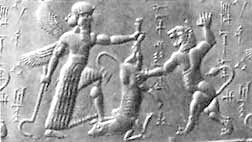 Gilgamesh (left) and Enkidu, defeating Inanna's Bull Of Heaven
Gilgamesh (left) and Enkidu, defeating Inanna's Bull Of Heaven
He who saw everything in the broad-boned earth, and knew what was to be knownWho had experienced what there was, and had become familiar with all things He, to whom wisdom clung like cloak, and who dwelt together with Existence in HarmonyHe knew the secret of things and laid them bare. And told of those times before the Flood In his city, Uruk, he made the walls, which formed a rampart stretching onAnd the temple called Eanna, which was the house of An, the Sky GodAnd also of Inanna, Goddes of Love and BattleLook at it even now: where cornice runs on outer wall shining brilliant copper -see,There is no inner wall; it has no equal. Touch the threshold - ancient. Approach the palace called Eanna.There lives Inanna, Goddess of Love and Battle. No king since has accomplished such deeds.Climb that wall, go in Uruk, walk there, I say, walk there.See the foundation terrace, touch then the masonry - Is not this of burnt brick, And good? I say; The seven sages laid its foundation. One third is city; One third is orchards; One third is clay pits- Unbuilt-on land of the Inanna Temple search these three parts, find the copper table-boxOpen it. Open its secret fastening. Take out the lapis-lazuli tablet. Read aloud from it.Read how Gilgamesh fared many hardshipsSurpassing all kings, great in respect, a lord in his formHe is the hero, He is of Uruk, He, the butting bullHe leads the Way, He, the Foremost, He also marches at the rear, a helper to his brothersHe is the Great Net, protector of his men. He is the furious flood-wave,Who destroys even stone walls. The offspring of Lugulbanda, Gilgamesh is perfect in strengthThe son of the revered Cow, of the woman Rimat-Ninsun. Gilgamesh inspires perfect awe. He opened the mountain passes, he dug the well on the mountain's flank.He crossed to the far shore, traversed the vast sea to the rising Sun. He explored the rim, sought life without death. By his strength he reached Ziusudra the FarawayHe who restored living things to their places Those which the Flood had destroyedAmidst the teeming peoples,Who is there to compare with him in kingship?Who like Gilgamesh can say:'I am king indeed?'His name was called GilgameshFrom the very day of his birth,He was two-thirds god, one third man,The Great Goddess Aruru designed him, planned his body, prepared his formA perfect body the gods gaveFor the creation of GilgameshShamash the Sun gave beautyAdad the Storm gave courageAnd so he surpassed all others.He was two-thirds god, one third man,The form of his body no one can matchEleven cubits high he is, nine spans his chestAs he turns to see the lands all around him.But he comes to the city of Uruk.Long was his journey, weary, worn down by his laboursHe inscribed upon a stone when he returnedThis story.
TABLET IOut I went, into the world, but there was none better, none whom he, Gilgamesh, could not best. And so, with his arms, he returned to Uruk. But in their houses, the men of Uruk muttered:'Gilgamesh, noisy Gilgamesh! Arrogant Gilgamesh!' All young men gone - Defeated by Gilgamesh, and no son was left to his father. All young girls made women by GilgameshHis lusts are such, and no virgin left to her lover!Not the daughter of a warrior,Nor the wife of a nobleman!Yet he is king and should beThe people's careful shepherd.He is king and should beShepherd of the city.He is wise, he is handsome, he is firm as a rock.In heaven the gods heard Heard the lament of the people, And the gods cried out to the Great God, higher king of Uruk:'Strong as a wild bull is this GilgameshSo he was made by Aruru, the godessNone there is who can - not oneNone who can survivea him in fighting.No son left to his father.Gilgamesh, he takes them all, and is heHe the king? Shepherd of the people?No virgin left to her lover, For he lusts strongly! No, nor the wife of the nobleman!The Great God heard this, thenTo the Goddess of Creation, Aruru -Cried all the gods:'You created this Gilgamesh! Well, create him his equal!Let him look as into mirrors - Give a second self to him, yes;Rushing winds meet rushing winds!Let them flow heart to heart against -Give them each other to fight, Leaving Uruk in peace!'So the Goddess of Creation took and formed in her mindThis image, and there it was conceived -in her mind, and it was made of materialThat composes the Great God,He of the Firmament.She then plunged her hands down into water and pinched off a little clay. She let it drop in the wildernessThus the noble Enkidu was made. For this was he the very strength of Ninurta, the God of War, was his form, rough bodied, long hair,His hair waved like corn filaments -Yes, like the hair of that goddessWho is the corn, she , Nisaba. Matted hair was all over his body, like the skins of the cattle.Yes, like the body of that god. Who is the cattle, he, Samugan.This Enkidu was innocent of mankind.He knew not the cultivated land.Enkidu was in the hillsWith the gazelles -They jostled each otherWith all the herdsHe too loved the water-hole. But one day by a water holeA trapper met himYes, face to face,Because the herds of wild gameHad strayed into his territory.On three days face to face -Each day the trapper wa terrified,Frozen stiff with fear.With his game he went home,Unable to speak, numb with fright.The trapper's face altered, new -A long journey does that to one,Gives a new visage upon returning -The trapper, his heart all awe, told his father:'Father, what a man! No other like him! He comes from the hills, strongest alive!A star in heaven his strength, Of the star essense of An, the Sky FatherOver the hills with the beastsEating grassRanges across all your land,Goes to the wells.I fear him, stay far away.He fills in my pitsTears up my game trapsHelps the beasts escape;Now all the game slips away -Through my fingers.'His father opened his mouth,Told the son, the trapper:'My son, in Uruk lives Gilgamesh.None can withstand him,None has surpassed him,As a star in heaven his strengthOf the star-essence of An, the Sky Father. Go to Uruk, find GilgameshPraise the wild man's strength ask for a temple hierodule from the Temple of Love,Such a child of pleasure;Bring her and let her power fo womanSubdue this wild man.When he goes to the wells,He will embrace the priestessAnd the wild beasts will reject him.'To Uruk the trapper wentAnd said to Gilgamesh:'Like no other, wild,Roaming in the pastures,A star in heaven his strengthOf the star-essence of An, the Sky Father.I am afraid, stay far away; he helps the beasts escapeFills in my pitsTears up my game traps.' Gilgamesh said:'Trapper, return,Take a priestess, child of pleasure -When he goes to the wellsHe will embrace the priestessAnd the wild beasts will reject him.'Then returned with the hieroduleAnd three days to the drinking hole,There sat downHierodule facing the trapper,Waiting for the game.First day, nothing.Second day, nothing.Third day, yes.The herds came to drink, and Enkidu -Glad for the water were the small wild beasts,And Enkidu was glad for the water -He of the gazelles and wild grass,Born in the hills.The priestess saw this manWild from the hills.'There, woman,'the trapper,'Bare your breasts now;This is he,Have no shame, delay not,Welcome his love,Let him see you naked,Let him possess your body.As he approaches, take off your clothes,Lie with him, teach him,The savage, your art of woman,For as he loves you, thenThe wild beasts, his companions,They will reject him.'She had no shame for this,Made herself nakedWelcomed his eagernessIncited him to love, Taught the woman's art.Six days, seven nights,That time lying together,Enkidu had forgotten his homeHad forgotten the hillsAfter that time he was satisfied.Then he went back to the wild beasts -But the gazelles saw him and ran,The wild beasts saw him and ran.Enkidu would follow, but weak,His strength gone through woman;Wisdom was in him,Thoughts in his hear - a man's.So he returned to the priestess.At her feet he listened intently'You have wisdom, Enkidu.Now you are as a god. Why the beasts? Why the hills?Come to Uruk of the strong wallsTo Inanna's Temple of Love, And to the Eanna, Where the Sky God An can be found. Gilgamesh is there, strong,Raging like a wild bull, over allIs his strength.'Favourably as he speaks, he hears her words.He comes to know his own heartAnd his desire to find a friend.He tells her, the priestess:'Take me, girl, to the sacred pureDwelling of Love and Sky God's houseWhere lives Gilgamesh of perfect strength,He who rages like a bull over all,And I will summon him forth and challenge himAnd I will shout in Uruk:"I am the mightiest!Yes, I can change the order of what is!Anyone born on the steppe is mighty and has strength"''Then let us go that he may see your faceAnd I will show you Gilgamesh, for I know well where he is.Come Enkidu, to Uruk of ramparts,Where all are dressed for festival,Where each day is a festival, Where there are boys,Where there are girls,Deliciously ripe and perfumed,Who drive the great ones from their fretted couchesTo you, Enkidu, of joy in lifeI will show Gilgamesh of joy in lifeSee him, see his faceRadiant is his manhood, of full-bodied vigourHis body ripe with beauty in every part.So exceeding you in strength,Needing no sleep by day or by night.Restrain you folly, Enkidu.Gilgamesh - Shamash the Sun is proud,Also An, the God of Firmament,Also valiant Enlil, his son,And Enki, his son also -All have given wisdom.Before you come from the open plainsGilgamesh will have dreamed of it.'And so Gilgamesh rose from his bedAnd to his mother, in revealing dreams, said:'Mother, I saw in a dream last nightThat there were stars in heavenAnd a star descended upon me like untoThe essence of An, the Sky God.I tried to lift it up, but it was too heavy for me,I tried to move it, but it would not be moved.The land of Uruk was around it,The land was placed roud about it.All the people were pressing towards it.All the nobles also came round it,And all my friends kissed its feet.I was drawn towards it as to a womanAnd I laid it at your feetAnd you said it was my equal.'She, the Wise, the Custodian of Knowledge,Says to her lord -She, Ninsun, Custodian of Knowledge,Says to Gilgamesh:'Your equal was a star of heavenWhich descended upon you like untoThe essence of An who his the God of the FirmamentYou tried to lift it but it would not be movedAnd I called it your equal, comparing it to you.You were drawn to it as to a woman.The meaning of thisIs of a strong friend who saves his companionHe is the strongest of the land; he has strength.As a star in heaven his strength,The strength of An of the Firmament and his host.So that you are drawn to him overwhelmingly.And this means he will never forsake you.Such is your dream.'Gilgamesh says again to his mother:'Mother, another dream In Uruk of the ramparts lay an axe - All were gathered around it,Uruk-land was standing round about it.The people pressed towards it;I laid it at your feet.I was drawn to it as to a woman.For you called it my equal.'She, the Wise Custodian of Knowledge, says to her son -'The axe is a manYou were drawn to it as to a womanFor I called it your equalAnd it was to rival you.This means a strong friend standing by his friendHe is the strongest of the land; he has strength.The essence of An of the Firmament, is his,So strong is he.'Gilgamesh then spoke to his mother'Now according to the word of God EnliLet a counsellor and friend come to meThat I may acquire a companionAnd to him I shall be friend and counsellor also.'And as Gilgamesh revealed his dreamThe girl was speaking to EnkiduAs they sat together.
TABLET II For six days and seven nightsEnkidu made love to that girlAnd the girl said to himShe said to Enkidu:'When I look at you, Enkidu, You seem to be like a god.Why the wild beasts?Whe the roaming over the steppe?Come with me,Come to ramparted Uruk.There the holy temple of EannaWhere the Great God An lives,Come with me, Enkidu, to the holy dwellingTo the temple, Sky God's house,For Gilgamesh of may deeds lives there.You are so like him.You will love him as yourself,Rise up from the earth,Come to a shepherd's bed!'There came upon his heartThe truth of what she said.He heard her wordsAnd they were good.She divided her clothing in two,One garment for him,One for herHolding his hand she led himLed him like a child.And they came to the hut of the shepherdsWhich is in the sheepfold.All the shepherds gathered round him,Pressed round him, were drawn to himThronged round the wild man.Of her instruction the priestess is proud,This is a man who is like Gilgamesh in form,Taller he is in form,He was born in the mountains,And like the star-essence of the Sky Father An, his strength is more powerful.And Enkidu sat at their tableThat he might eat of their produce.But he knew the milf of wild creatures,Which he sucked in the wilds.Theshppherds placed thier own food before him, andHe choked, he looked,He stared at it, at them,Enkidu knows nothing of this,He knows not eating food,What is this drink? This strong drink?He has not been taught it.Bread was set before him - he knows it not.Beer was set before him - he knows it not.Enkidu did not eat bread,He squeezed his eyes together, stared,The girl then spoke:She said to Enkidu:'Enkidu, eat that food.It is our de in life.Drink this strong drink.It is what is done here.'So Enkidu ate the food,Ate until he was full.He drank that strong drinkSeven cups of it (1).(A fragment of about 1,400 BCE published by Gernot Wilhelm gives a slightly different account of the preceding:)The priestess said to him, said to Enkidu:'You are exquisite Enkidu!Why do you run to and fro with the beasts of the steppe?You are like a god in your natureWho is there like you among men?'Again the priestess said to him, said to Enkidu:'Come, Enkidu! Let us go to the place of the sheepfold (2)'.She drew out a single garmentAnd he clothed himself.Leading him, she held his hand,And like a god was his countenance.She led him to the place of the sheepfold,The shepherds/people were gathered together,And the people spoke amongst themselves:'Look how he resembles Gilgamesh in his appearance!He is small in size but extremely strong in his bony frame.As soon as he was born in the mountains,He was in thehabit of sucking the milk of animals.'They set bread before himHe examined it and was puzzled by the bread.They set beer before him.He creased his eyes together and gazed at it;He was puzzled by the beer.The priestess said to him,Said to Enkidu:'Eat the bread, Enkidu,That you will be worthy of godliness!Drink the fine beer,That you will be worthy of kingship!'Enkidu ate the bread,He drank the fine beer (3),And indeed seven jugs of it (4).(We now return to the main version of the text)He felt so free, he felt so happyHe rejoiced so in his heart!His face became radiant.He rubbed all the shaggy growth,The hair of his body.He annointed himself with oilAnd thus he became a man.He donned clothing -Look! He is like a man!He takes up his weapon,He attacks the lionsSo the shepherds might have peace at night.He caught wolves,He captured lions,And the chief cattlemen could rest.Enkidu was their watchman, A man of strength,An unparalled hero!To the shepherds he said:'I am a man now.I can eat bread at the table,I can drink strong drink.But I have the strength of he who roams the steppe.I am stronger than you.No one is stronger.You see I catch wolves,You see I capture lions.Because of me the shepherds can rest at night,Because of me the chief catlemen can lie down.I am become the king of the sheepfold.'And Enkidu sat at the table,He ate the foodHe drank the strong drinkHe felt good in his heart.He made merryThen he looked upAnd saw a manHe told the girl:'Girl, bring the man.Why is he here?I must know his name!'The girl called the man,Went to him, said to himL'Sir, where are you going?Why have you taken this, your difficult course?'The man spoke, spoke to Enkidu:'Into the people's special place,,Their very own meeting-house,Even into it has he intruded!Set aside rules and laws for wedlock!On the city he heaped shame!Strange practices he has imposedUpon a city helpless to resist.For the king of ramparted UrukHas altered the unaltered way,Abused, changed the practices.Any new bride from the people is his;Gilgamesh, king of ramparted Uruk,He may mate with any new bride.Before the lawful husband may have her.The gods have ordained thisIn their wisdom, by their will.It was so decreed from the moment of birthWhen his umbilical cord was cut out.'At the mans's wordsThe face of Enkidu paled.Fury grew within his heart,His eyes became fightful to look uponEnkidu spoke his anger,Said to the man:'This cannot contine to be!I will go to ramparted Uruk.I will meet GilgameshI will bring his excesses to an end!'Enkidu set out for UrukEnkidu walked in frontThe girl walked behindWhen he entered ramparted UrukThe people thronged round himWhen he stopped in the street,In Uruk of the ramparts,Saying of him:'He is like Gilgamesh in form!He is smaller in sizeBut stronger in bone.He is a match for Gilgamesh!He is the strongest of the steppe, strength is his,Milk of wild creaturesHe once sucked.There will be endless clash of arms in Uruk!'The nobles rejoiced:'Here is a heroFor all who are honourable!To match divine GilgameshHere is his equal!'Now for the Goddess of LoveIs the bed made readyOf the evening, ready to receiveGilgamesh for his pleasures.Now he is coming alongBut Enkidu appears in the streetAnd bars his wayTo Gilgamesh is opposedThe might of EnkiduThe divine Gilgamesh is face to faceWith his equal, Enkidu of the steppes.The king of ramparted UrukSees his equal, who has strength,Smaller in size, but stronger of boneLike unto Gilgamesh to the hair.Gilgamesh sees his shaggy growth -On the steppe the grassSprouts in as much abundanceGilgamesh drew himself upAnd stood before himIn the market-place of the landWas there they met,And Enkidu blocked the gateWith his foot and Would not let Gilgamesh enterThey they grappled their belts and wrestled like championsRushing wind meets rushing wind,Heart to heart against -Holding fast like bulls.They shattered absolutely the doorpost of the holy gateAnd the wall shook with this fateful act.The doorway of the house of the familyWhere the bride awaited Gilgamesh,There they struggled.They fought in the street,They battled in the market.But in the end, Brought Enkidu to the earth,His own foot still on the ground,And won the contest.His anger vanishedHe turned awayBut when he turned awayEnkidu said to himSpoke to Gilgamesh:'As one single and uniqueYour mother bore youShe the wild cow of the steerfolds,She, Ninsun the Wise, she the StrongYou are raised above all menYou are king of the people by decreeOf Enlil, son of the Great God An!'
NOTES ON TABLET II 1. Seven cups or seven jugs (see 1988 fragment) are symbolic, representing the sacred number of the seven initiatory planets, i.e. the Moon (Nanna/Sin), Sun (Utu/Shamash), Venus (Inanna/Ishtar), Mars (Nergal), Earth, Saturn (Ninurta), Mercuri (Nabu) and Jupiter (Marduk).2. The 'sheepfold' was probably a reference to the rites of the Shepherd, or the King of the Land (See Tablet IV, note 1). 3. Eating of the bread and drining of the superior form of beer constituted probably a ritual of some kind, intended to prepare a candidate to the role of king and priest, a combination that was routine these days. 4. See note 1.
Gilgamesh - The King Who Refused to Die
Secret things he has seen;
What is hidden from Man, he found out.
He even brought tidings
of the time before the Deluge;
He also took the distant journey,
wearisome and under difficulties.
He returned, and upon a stone column
all his toil he engraved.
Of that olden Sumerian tale, less than two hundred lines have remained. Yet we know it from its translations into the languages of the peoples who followed the Sumerians in the Near East; Assyrians, Babylonians, Hittites, Hurrians. They all told and retold the tale; and the clay tablets on which these later versions were written down—some intact, some damaged, many fragmented beyond legibility—have enabled many scholars over the better part of a century to piece the tale together.
At the core of our knowledge are twelve tablets in the Akkadian language; they were part of the library of Ashurbanipal in Nineveh. They were first reported by George Smith, whose job at the British Museum in London was to sort out, match and categorize the tens of thousands of tablets and tablet fragments that arrived at the Museum from Mesopotamia. One day, his eye caught a fragmented text which appeared to relate the story of the Deluge. There was no mistaking: the cuneiform texts, from Assyria, were telling of a king who sought out the hero of the Deluge, and heard from him a first-person account of the event!
With understandable excitement, the Museum directors sent George Smith to the archaeological site to search for missing fragments. With luck, he found enough of them to be able to reconstruct the text and guess the sequence of the tablets. In 1876, he conclusively showed that this was, as his work was titled. The Chaldean Account of the Flood. From the language and style he concluded that it "was composed in Babylon circa 2000 B.C."
George Smith at first read the name of the king who searched for Noah Izdubur, and suggested that he was none other than the biblical hero-king Nimrod. For a time scholars believed that the tale indeed concerned the very first mighty king, and referred to the twelve-tablet text as the "Nimrod Epos." More finds and much further research established the Sumerian origin of the tale, and the true reading of the hero's name: GIL.GA.MESH. It has been confirmed from other historical texts—including the Sumerian King Lists—that he was a ruler of Uruk, the biblical Erech, circa 2900 B.C. The Epic of Gilgamesh, as this ancient literary work is now called, thus takes us back nearly 5,000 years. One must understand the history of Uruk to grasp the Epic's dramatic scope. Affirming the biblical statements, the Sumerian historical records also reported that in the aftermath of the Deluge, kingship—royal dynasties—indeed began at Kish; it then was transferred to Uruk as a result of the ambitions of Irnini/Ishtar, who cherished not at all her domain far away from Sumer.
Uruk, initially, was only the location of a sacred precinct, where an Abode (temple) for An, the "Lord of Heaven," was perched atop a vast ziggurat named E.AN.NA ("House of An"). On the rare occasion of An's visits to Earth, he took a liking to Irnini. He bestowed on her the title IN.AN.NA—"Beloved of An" (the ancient gossip suggested that she was beloved in more than platonic ways), and installed her in the Eanna, which otherwise stood unoccupied.
But what good was a city without people, a lordship with no one to rule over? Not too far away to the south, on the shores of the Persian Gulf, Ea lived in Eridu in semi-isolation. There he kept track of human affairs, dispensing knowledge and civilization to mankind. Enchanting and perfumed, Inanna paid Ea (a great-uncle of hers) a visit. Enamored and drunk. Ea granted her wish: to make Uruk the new center of Sumerian civilization, the seat of kingship in lieu of Kish.
To carry out her grandiose plans, whose ultimate goal was to break into the Inner Circle of the Twelve Great Gods, Inanna-Ishtar enlisted the support of her brother Utu/Shamash. Whereas in the days before the Deluge the intermarriage between the Nefilim and the daughters of Man brought about the wrath of the Gods, the practice was no longer frowned upon in the aftermath of the Deluge.
And so it was, that the high priest at the temple of An was at the time a son of Shamash by a human female. Ishtar and Shamash anointed him as king of Uruk, starting the world's first dynasty of priestly kings. According to the Sumerian King Lists, he ruled for 324 years. His son, "who built Uruk," ruled for 420 years. When Gilgamesh, the fifth ruler of this dynasty, ascended the throne, Uruk wasalready a thriving Sumerian center, lording over its neighbors and trading with far lands. (Fig. 61).
An offspring of the great God Shamash on his father's side, Gilgamesh was considered to be "two-thirds God, one-third human" by the further fact that his mother was the Goddess NIN.SUN (Fig. 62). He was thus accorded the privilege of having his name written with the prefix "divine."
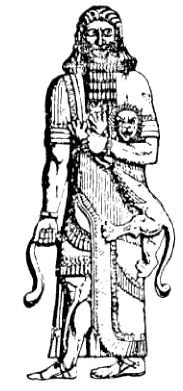
Fig. 61
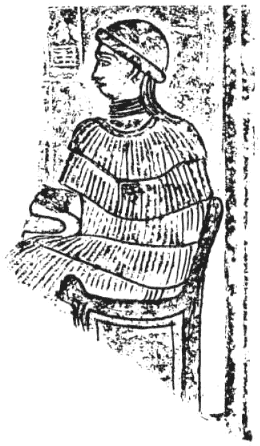
Fig. 62
Proud and self-assured, Gilgamesh began as a benevolent and conscientious king, engaged in the customary tasks of raising the city's ramparts or embellishing the temple precinct. But the more knowledge he acquired of the histories of Gods and men, the more he became philosophical and restless. In the midst of merriment, his thoughts turned to death. Would he, by virtue of his divine two-thirds, live as long as his demi-God forefathers—or would his one-third prevail, and determine for him the life span of a mortal human?
Before long, he confessed his anxiety to Shamash:
In my city man dies; oppressed is my heart.
Man perishes; heavy is my heart...
Man, the tallest, cannot stretch to heaven;
Man, the widest, cannot cover the earth.
"Will I too 'peer over the wall'?" he asked Shamash;
"will I too be fated thus?"
Evading a direct answer—perhaps not knowing it himself—Shamash attempted to have Gilgamesh accept his fate, whatever it might be, and to enjoy life while he could:
When the Gods created Mankind,
Death for Mankind they allotted;
Life they retained in their own keeping.
Therefore, said Shamash,
Let full be thy belly, Gilgamesh;
Make thou merry by day and night!
Of each day, make thou a feast of rejoicing;
Day and night, dance thou and play!
Let thy garments be sparkling fresh,
thy head washed; bathe thou in water.
Pay heed to the little one that holds thy hand,
let thy spouse delight in thy bosom;
for this is the fate of Mankind.
But Gilgamesh refused to accept this fate. Was he not two-thirds divine, and only one-third human? Why then should the lesser mortal part, rather than his greater Godly element, determine his fate? Roving by daytime, restless at night, Gilgamesh sought to stay young by intruding on newlywed couples and insisting on having intercourse with the bride ahead of the bridegroom. Then, one night, he saw a vision which he felt was an omen. He rushed to his mother to tell her what he saw, so that she might interpret the omen for him:
My mother,
During the night, having become lusty,
I wandered about.
In the midst (of night) omens appeared.
A star grew larger and larger in the sky.
The handiwork of Anu descended towards me!
"The handiwork of Anu" that descended from the skies fell to Earth near him, Gilgamesh continued to relate:
I sought to lift it;
it was too heavy for me.
I sought to shake it;
I could neither move nor raise it.
While he was attempting to shake loose the object, which must have embedded itself deep into the ground, "the populace jostled toward it, the nobles thronged about it." The object's fall to Earth was apparently seen by many, for "the whole of Uruk land was gathered around it." The "heroes"— the strongmen—then lent Gilgamesh a hand in his efforts to dislodge the object that fell from the skies:
"The heroes grabbed its lower part, I pulled it up by its forepart."
While the object is not fully described in the texts, it was certainly not a shapeless meteor, but a crafted object worthy of being called the handiwork of the great Anu himself. The ancient reader, apparently, required no elaboration, having been familiar with the term ("Handiwork of Anu") or with its depiction, as possibly the one shown on an ancient cylinder seal (Fig. 63).
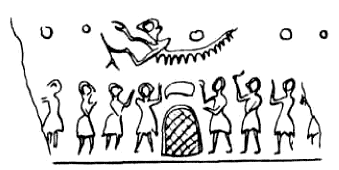
Fig. 63
The Gilgamesh text describes the lower part, which was grabbed by the heroes, by a term that may be translated "legs." It had, however, other pronounced parts and could even be entered, as becomes clear from the further description by Gilgamesh of the night's events:
I pressed strongly its upper part;
I could neither remove its covering,
nor raise its Ascender...
With a destroying fire its top 1 (then) broke off,
and moved into its depths.
Its movable That Which Pulls Forward
I lifted, and brought it to thee.
Gilgamesh was certain that the appearance of the object was an omen from the Gods concerning his fate. But his mother, the Goddess Ninsun, had to disappoint him. That which descended like a star from Heaven, she said, foretells the arrival of,
"a stout comrade who rescues; a friend is come to thee... he is the mightiest in the land... he will never forsake thee. This is the meaning of thy vision."
She knew what she was talking about; for unbeknown to Gilgamesh, in response to pleas from the people of Uruk that something be done to divert the restless Gilgamesh, the Gods arranged for a wild man to come to Uruk and engage Gilgamesh in wrestling matches.
He was called ENKI.DU—"A Creature of Enki"—a kind of Stone Age Man who had been living in the wilderness among the animals and as one of them: "The milk of wild creatures he was wont to suck." He was depicted naked, bearded, with shaggy hair—often shown in the company of his animal friends (Fig. 64).
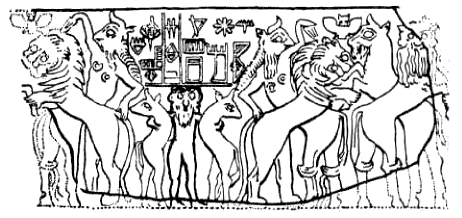
Fig. 64
To tame him, the nobles of Uruk assigned a harlot. Enkidu, until then knowing only the company of animals, regained his human element as he made love to the woman, over and over again. Then she brought Enkidu to a camp outside town, where he was coached in the speech and manners of Uruk and in the habits of Gilgamesh. "Restrain Gilgamesh, be a match for him!" the nobles told Enkidu.
The first encounter took place at night, as Gilgamesh left his palace and started to roam the streets, looking for sexual adventures. Enkidu met him in the street, barring his way. "They grappled each other, holding fast like bulls." Walls shook, doorposts were shattered as the two wrestled. At last, "Gilgamesh bent the knee"; the match was over: He lost to the stranger. "His fury abated, Gilgamesh turned away." Just then, Enkidu addressed him, and Gilgamesh recalled his mother's words. Here then was his new "stout friend." "They kissed each other, and formed a friendship."
As the two became inseparable friends, Gilgamesh began to reveal to Enkidu his fear of a mortal's fate. On hearing this, "the eyes of Enkidu filled with tears, ill was his heart, bitterly he sighed." Then he told Gilgamesh, that there is a way to outsmart his fate: to force his way into the secret Abode of the Gods. There, if Shamash and Adad would stand by him, the Gods could accord him the divine status to which he was entitled.
The "Abode of the Gods," Enkidu related, was in "the cedar mountain." He happened to discover it, he said, as he was roaming the lands with the wild beasts; but it was guarded by a fearsome monster named Huwawa:
I found it, my friend, in the mountains
as I was roaming with the wild beasts.
For many leagues extends the forest:
I went down into its midst.
Huwawa (is there); his roar is like a flood,
his mouth is fire,
his breath is death...
The Cedar Forest's watcher, the Fiery Warrior, is mighty, never resting... To safeguard the Cedar Forest, as a terror to mortals the God Enlil appointed him.
The very fact that Huwawa's main duty was to prevent mortals from entering the Cedar Forest only whetted the determination of Gilgamesh to reach the place; for surely, it was there that he could join the Gods and escape his mortal's fate:
Who, my friend, can scale heaven?
Only the Gods,
by going to the underground place of Shamash.
Mankind's days are numbered;
whatever they achieve is but the wind.
Even thou art afraid of death,
in spite of your heroic might.
Therefore,
Let me go ahead of thee,
let thy mouth call to me:
"Advance, fear not!"
This, then, was the plan: by going to "the underground place of Shamash" in the Cedar Mountain, to be enabled to "scale heaven" as the Gods do. Even the tallest man, Gilgamesh earlier pointed out, "cannot stretch to heaven." Now he knew where the place was, from which Heaven could be scaled.
He fell to his knees and prayed to Shamash:
"Let me go, O Shamash! My hands are raised in prayer ... to the Landing Place, give command... Establish over me thy protection!"
The text's lines containing the answer of Shamash are, unfortunately, broken off the tablet. We do learn that "when Gilgamesh inspected his omen... tears ran down his face." Apparently he was permitted to go ahead—but at his own risk. Nevertheless, Gilgamesh decided to proceed, and fight Huwawa without the God's aid.
"Should I fail," he said, people will remember me: "Gilgamesh, they will say, against fierce Huwawa has fallen."
But should I succeed, he continued—I will obtain a Shem—the vehicle "by which one attains eternity."
As Gilgamesh ordered special weapons with which to fight Huwawa, the elders of Uruk tried to dissuade him. "Thou are yet young, Gilgamesh," they pointed out—and why risk death with so many sure years to live anyway, against unknown odds of success: "That which thou wouldst achieve, thou knowest not." Gathering all available information about the Cedar Forest and its guardian, they cautioned Gilgamesh:
We hear that Huwawa is wondrously built; Who is there to face his weapons?
Unequal struggle it is with the siege-engine Huwawa.
But Gilgamesh only "looked around, smiling at his friend." The talk of Huwawa as a mechanical monster, a "siege engine" that is "wondrously built," only encouraged him to believe that it was indeed controllable by commands from the Gods Shamash and Adad. Since he himself did not succeed in obtaining a clear-cut promise of support from Shamash, Gilgamesh decided to enlist his mother in the effort.
"Graspingeach other, hand in hand, Gilgamesh and Enkidu to the Great Palace go,to the presence of Ninsun, the Great Queen. Gilgamesh came forward ashe entered the palace: 'O Ninsun (he said)... a far journey I haveboldly undertaken, to the place of Huwawa; an uncertain battle I amabout to face; unknown pathways I am about to ride. Oh my mother, praythou to Shamash on my behalf!'"
Obliging,
"Ninsun entered her chamber, put on a garment as beseems her body, put on an ornament as beseems her breast... donned her tiara."
Then she raised her hands in prayer to Shamash—putting the onus of the voyage on him;
"Why," she asked rhetorically, "having given me Gilgamesh for a son, with a restless heart didst thou endow him? And now, thou didst affect him to go on a far journey, to the place of Huwawa!"
She called upon Shamash to protect Gilgamesh:
Until he reaches the Cedar Forest, Until he has slain the fierce Huwawa, Until the day that he goes and returns.
As the populace heard that Gilgamesh was going to "the Landing Place" after all, "they pressed closer to him" and wished him success. The city elders offered more practical advice:
"Let Enkidu go before thee: he knows the way ... in the forest, the passes of Huwawa let him penetrate ... he who goes in front saves the companion!"
They too invoked the blessings of Shamash:
"LetShamash grant thee thy desire; what thy mouth hath spoken, let him showthine eyes; may he open for thee the barred path, the road unclose forthy treading, the mountain unclose for thy foot!"
Ninsun had a few parting words. Turning to Enkidu, she asked him to protect Gilgamesh; "although not of my womb's issue art thou, I herewith adopt thee (as a son)," she told him; guard the king as thy brother! Then she placed her emblem around the neck of Enkidu.
And the two were off on their dangerous quest. The fourth tablet of the Epic of Gilgamesh is devoted to the comrades' journey to the Cedar Forest; unfortunately, the tablet is so fragmented that, in spite of the discovery of parallel fragments in the Hittite language, no cohesive text could be put together.
It is evident, however, that they traveled a great distance, toward a western destination. On and off, Enkidu tried to persuade Gilgamesh to call off the quest. Huwawa, he said, can hear a cow moving sixty leagues away. His "net" can grasp from great distances; his call reverberates from the "Place Where the Rising Is Made" as far back as to Nippur; "weakness lays hold on him" who approaches the forest's gates. Let us turn back, he pleaded.
But proceed they did:
At the green mountain the two arrived.
Their words were silenced;
They themselves stood still.
They stood still and gazed at the forest;
They looked at the height of the cedars;
They looked at the entrance to the forest.
Where Huwawa wont to move was a path:
straight were the tracks, a fiery channel.
They beheld the Cedar Mountain,
Abode of the Gods,
the Crossroads of Ishtar.
Awestruck and tired, the two lay down to sleep. In the middle of the night they were awakened. "Didst thou arouse me?" Gilgamesh askedEnkidu. No, said Enkidu. No sooner had they dozed off than Gilgamesh again awakened Enkidu. He had witnessed an awesome sight, he said— unsure whether he was awake or dreaming:
In my vision, my friend,
the high ground toppled.
It laid me low, trapped my feet...The glare was overpowering!
A man appeared;
the fairest in the land was he...
From under the toppled ground he pulled me out.
He gave me water to drink; my heart quieted.
On the ground he set my feet.
Who was this "man"—"the fairest in the land"—who pulled Gilgamesh from under the toppled ground? What was the "overpowering glare" that accompanied the landslide? Enkidu had no answers; tired, he went back to sleep. But the night's tranquility was shattered once again:
In the middle of the watch,
the sleep of Gilgamesh was ended.
He started up, saying to his friend:
"My friend, didst thou call me?
Why am I awake?
Didst thou not touch me?
Why am I startled?
Did not some God go by?
Why is my flesh numb?"
Denying that he had awakened Gilgamesh, Enkidu left his comrade wondering whether it was "some God who went by." Bewildered, the two fell asleep again, only to be awakened once more. This is how Gilgamesh described what he saw:
The vision that I saw was wholly awesome!
The heavens shrieked, the earth boomed.
Though daylight was dawning, darkness came.
Lightning flashed, a flame shot up.
The clouds swelled; it rained death!
Then the glow vanished; the fire went out.
And all that had fallen was turned to ashes.
Gilgamesh must have realized that he had witnessed the ascent of a "Sky Chamber": the shaking ground as the engines ignited and roared; the clouds of smoke and dust that enveloped the site, darkening the dawn sky; the brilliance of the engines' fire, seen through the thick clouds; and—as the jetcraft was aloft—its vanishing glow. A "wholly awesome" sight indeed! But one which only encouraged Gilgamesh to proceed, for it confirmed that he in fact had reached the "Landing Place."
In the morning the comrades attempted to penetrate the forest, careful to avoid "weapon-trees that kill." Enkidu found the gate, of which he had spoken to Gilgamesh. But as he tried to open it, he was thrown back by an unseen force. For twelve days he lay paralyzed.
When he was able to move and speak again, he pleaded with Gilgamesh: "Let us not go down into the heart of the forest." But Gilgamesh had good news for his comrade: while the latter was recovering from the shock, he— Gilgamesh—had found a tunnel. By the sounds heard from it, Gilgamesh was sure that it was connected to "the enclosure from which words of command are issued." Come on, he urged Enkidu; "do not stand by, my friend; let us go down together!"
Gilgamesh must have been right, for the Sumerian text states that
Pressing on into the forest, the secret abode of the Anunnaki he opened up.
The entrance to the tunnel was grown over with (or hidden by) trees and bushes and blocked by soil and rocks. "While Gilgamesh cut down the trees, Enkidu dug up" the soil and rocks. But just as they made enough of a clearance, terror struck: "Huwawa heard the noise, and became angry." Now he appeared on the scene looking for the intruders. His appearance was "Mighty, his teeth as the teeth of a dragon; his face the face of a lion; his coming like the onrushing floodwaters." Most fearsome was his "radiant beam.''
Emanating from his forehead, "it devoured trees and bushes." From its killing force, "none could escape." A Sumerian cylinder seal depicted a God, Gilgamesh and Enkidu flanking a mechanical robot, no doubt the epic's "Monster with the Killing Beams" (Fig. 65).
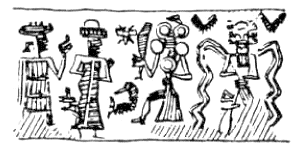
Fig. 65
It appears from the fragmented texts that Huwawa could armor himself with "seven cloaks," but when he arrived on the scene "only one he had donned, six are still off." Seeing this as their opportunity, the two comrades attempted to ambush Huwawa. As the monster turned to face his attackers, the Killing Beam from his forehead traced a path of destruction.
In the nick of time, rescue appeared from the heavens. Seeing their predicament, "down from the skies spoke to them divine Shamash." Do not try to escape, he advised them; instead, "draw near Huwawa." Then Shamash raised a host of swirling winds, "which beat against the eyes of Huwawa" and neutralized his beam. As Shamash had intended,
"the radiant beams vanished, the brilliance became clouded."
Soon, Huwawa was immobilized: "he is unable to move forward, nor is he able to move back."
The two then attacked Huwawa: "Enkidu struck the guardian, Huwawa, to the ground. For two leagues the cedars resounded," so immense was the monster's fall.
Then Enkidu "Huwawa put to death."
Exhilarated by their victory but exhausted by the battle, the two stopped to rest by a stream. Gilgamesh undressed to wash himself. "He cast off his soiled things, put on his clean ones; wrapped a fringed cloak about him, fastened with a sash." There was no need to rush: the way to the "secret abode of the Anunnaki" was no longer blocked. Little did he know that a female's lust would soon undo his victory....
The place, as stated earlier in the epic, was the "Crossroads of Ishtar." The Goddess herself was wont to come and go from this "Landing Place." She too, like Shamash, must have watched the battle—perhaps from her aerial ("winged") Sky Chamber, as depicted on a Hittite seal (Fig. 66). Now, having seen Gilgamesh undress and bathe, "glorious Ishtar raised an eye at the beauty of Gilgamesh."
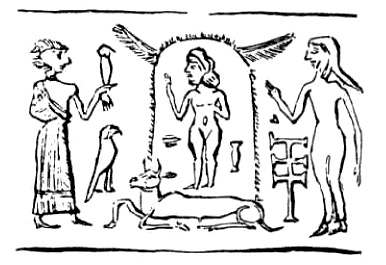
Fig. 66
Approaching the hero, she minced no words about what was on her mind:
Come, Gilgamesh, be thou my lover!
Grant me the fruit of thy love.
You be my man,
I shall be your woman!
Promising him golden chariots, a magnificent palace, lordship over other kings and princes, Ishtar was sure she had enticed Gilgamesh. But answering her, he pointed out that he had nothing he could give her, a Goddess, in return. And as to her "love," how long would that last? Sooner or later, he said, she would rid herself of him as of "a shoe which pinchesthe foot of its owner." Calling off the names of other men with whom she had been promiscuous, he turned her down. Enraged by this insulting refusal, Ishtar asked Anu to let the "Bull of Heaven" smite Gilgamesh.
Attacked by the Sky Monster, Gilgamesh and Enkidu forgot all about their mission, and ran for their lives. Aiding their escape back to Uruk, Shamash enabled them "the distance of a month and fifteen days, in three days to traverse." But on the outskirst of Uruk, on the Euphrates River, the Bull of Heaven caught up with them. Gilgamesh managed to reach the city, to summon its warriors.
Outside the city walls, Enkidu alone remained to hold off the Sky Monster. When the Bull of Heaven "snorted," pits were opened in the earth, large enough to hold two hundred men each. As Enkidu fell into one of the pits, the Bull of Heaven turned around. Quickly Enkidu climbed out, and put the monster to death.
What exactly the Bull of Heaven was, is not clear. The Sumerian term— GUD.AN.NA—could also mean "Anu's attacker," his "cruise missile." Ancient artists, fascinated by the episode, frequently depicted Gilgamesh or Enkidu fighting with an actual bull, with the naked Ishtar (and sometimes Adad) looking on (Fig. 67a).
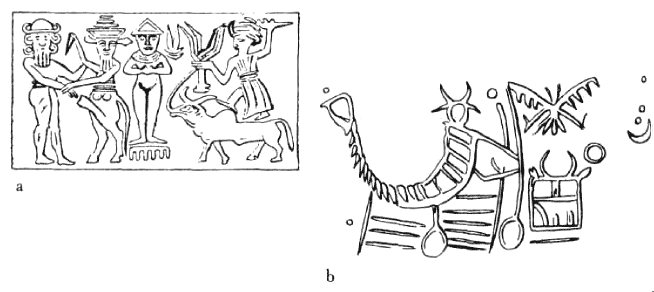
(Fig. 67a) .(Fig.67b).
But from the Epic's text it is clear that this weapon of Anu was a mechanical contraption made of metal and equipped with two piercers (the "horns") which were "cast from thirty minas of lapis, the coating on each being two fingers thick." Some ancient depictions show such a mechanical "bull," sweeping down from the skies (Fig. 67b).
After the Bull of Heaven was defeated, Gilgamesh,
"called out to the craftsmen, the armorers, all of them" to view the mechanical monster andtake it apart. Then, triumphant, he and Enkidu went to pay homage to Shamash. But "Ishtar, in her abode, set up a wail."
In the palace, Gilgamesh and Enkidu were resting from nightlong celebrations. But at the Abode of the Gods, the supreme Gods were considering Ishtar's complaint. "And Anu said to Enlil: 'Because the Bull of Heaven they have slain, and Huwawa they have slain, the two of them must die.' But Enlil said: 'Enkidu shall die, let Gilgamesh not die. " Then Shamash interceded: it was done with his concurrence; why then should "innocent Enkidu die?"
While the Gods deliberated, Enkidu was afflicted with a coma. Distraught and worried, Gilgamesh "paced back and forth before the couch" on which Enkidu lay motionless. Bitter tears flowed down his cheeks. As sorry as he was for his comrade, his thoughts turned to his own permeating anxiety: will he too lie one day dying like Enkidu? Will he, after all the endeavors, end up dead as a mortal?
In their assembly, the Gods reached a compromise. The death sentence of Enkidu was commuted to hard labor in the depths of the mines—there to spend the rest of his days. To carry out the sentence and take him to his new home, Enkidu was told, two emissaries "clothed like birds, with wings for garments" shall appear unto him. One of them, "a young man whose face is dark, who like a Bird-Man is his face," shall transport him to the Land of the Mines:
He will be dressed like an Eagle;
By the arm he will lead thee.
"Follow me," (he will say); he will lead you
To the House of Darkness,
the abode below the ground;
The abode which none leave who have entered into it.
A road from which there is no return; A House whose dwellers are bereft of light,
where dust is in their mouths
and clay is their food.
An ancient depiction on a cylinder seal illustrated the scene, showing a Winged Emissary ("angel") leading Enkidu by the arm (Fig. 68).
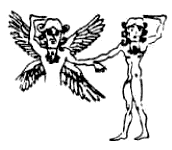
Fig. 68
Hearing the sentence passed on his comrade, Gilgamesh had an idea. Not far from the Land of Mines, he had learned, was the Land of the Living: the place whereto the Gods had taken those humans who were granted eternal youth!
It was "the abode of the forefathers who by the great Gods with the Purifying Waters were anointed." There, partaking of the food and beverage of the Gods, have been residing
Princes born to the crown
who had ruled the land in days of yore;
Like Anu and Enlil, spiced meats they are served,
From waterskins, cool water to them is poured.
Was it not the place whereto the hero of the Deluge, Ziusudra/ Utnapishtim, had been taken—the very place from which Etana "to heaven ascended"?
And so it was, that "the lord Gilgamesh, toward the Land of the Living set his mind." Announcing to the revived Enkidu that he would accompany him at least on part of his journey, Gilgamesh explained:
O Enkidu,
Even the mighty wither, meet the fated end.
(Therefore) the Land I would enter,
I would set up my Shem.
In the place where the Shems have been raised up,
I a Shem I would raise up.
However, proceeding from the Land of Mines to the Land of the Living was not a matter for a mortal to decide. In the strongest possible words, Gilgamesh was advised by the elders of Uruk and his Goddess mother to first obtain the permission of Utu/Shamash:
If the Land thou wish to enter,
inform Utu, inform Utu, the hero Utu!
The Land, it is in Utu's charge;
The Land which with the cedars is aligned,
it is the hero Utu's charge.
Inform Utu!
Thus forewarned and advised, Gilgamesh offered a sacrifice to Utu, and appealed for his consent and protection:
O Utu,
The Land I wish to enter;
be thou my ally!
The Land which with the cool cedars is aligned
I wish to enter; be thou my ally!
In the places where the Shems have been raised up,
Let me set up my Shem!
At first, Utu/Shamash doubted whether Gilgamesh could qualify to enter the land. Then, yielding to more pleading and prayers, he warned him that his journey would be through a desolate and arid area:
"the dust of the crossroads shall be thy dwelling place, the desert shall be thy bed... thorn and bramble shall skin thy feet... thirst shall smite thy cheeks."
Unable to dissuade Gilgamesh, he told him that the "place where the Shems have been raised" is surrounded by seven mountains, and the passes guarded by fearsome "Mighty Ones" who can unleash "a scorching fire" or "a lightning which cannot be turned back." But in the end, Utu gave in:
"the tears of Gilgamesh he accepted as an offering; like one of mercy, he showed him mercy."
But "the lord Gilgamesh acted frivolously." Rather than take the harsh overland road, he planned to cover most of the route by a comfortable sea voyage; after landing at the distant destination, Enkidu would go to the Land of Mines, and he (Gilgamesh) would proceed to the Land of the Living. He selected fifty young, unattached men to accompany him and Enkidu, and be rowers of the boat. Their first task was to cut and haul back to Uruk special woods, from which the MA.GAN boat—a "ship of Egypt"— was built. The smiths of Uruk fashioned strong weapons. Then, when all was ready, they sailed away.
They sailed, by all accounts, down the Persian Gulf, planning no doubt to circumnavigate the Arabian peninsula and then sail up the Red Sea toward Egypt. But the wrath of Enlil was swift to come. Had not Enkidu been told that a young "angel" would take him by the arm and bring him to the Landof Mines? How come, then, he was sailing with the joyful Gilgamesh, with fifty armed men, in a royal ship?
At dusk, Utu—who may have seen them off with great misgivings—"with lifted head went away." The mountains along the distant coast "became dark, shadows spread over them." Then, "standing alongside the mountain," there was someone who—like Huwawa—could emit rays "from which none can escape." "Like a bull he stood on the great Earth house"—a watchtower, it seems.
The fearsome watchman must have challenged the ship and its passengers, for fear overcame Enkidu. Let us turn back to Uruk, he pleaded. But Gilgamesh would not hear of it. Instead, he directed the ship toward the shore, determined to fight the watchman—"that 'man,' ifa man he be, or ifa God he be."
It was then that calamity struck. The "three ply cloth"—the sail—tore apart. As if by an unseen hand, the boat capsized; and all in it sank down. Somehow, Gilgamesh managed to swim ashore; so did Enkidu. Back in the waters, they saw the sunken ship with its crew still at their posts, looking amazingly alive in their deaths:
After it had sunk, in the sea had sunk,
On the eve when the Magan-boat had sunk.
After the boat, destined to Magan,
had sunk—Inside it, as though still living creatures,
were seated those who of a womb were born.
They spent the night on the unknown shore, arguing which way to go. Gilgamesh was still determined to reach "the land." Enkidu advised seeking a way back to "the city," Uruk. Soon, however, weakness overcame Enkidu. With passionate comradeship, Gilgamesh exhorted Enkidu to hold on to life: "My little weak friend," he fondly called him; "to the land I will bring thee," he promised him. But "Death, which knows no distinction," could not be held off.
For seven days and seven nights Gilgamesh mourned Enkidu, "until a worm fell out of his nose." At first he wandered aimlessly:
"For his friend, Enkidu, Gilgamesh weeps bitterly as he ranges over the wilderness... with woe in his belly, fearing death, he roamed the wilderness."
Again he was preoccupied with his own fate—"fearing death"—wondering: "When I die, shall I not be like Enkidu?"
Then his determination to ward off his fate took hold of him again.
"Must I lay my head inside the earth, and sleep through all the years?" he demanded to know of Shamash. "Let mine eyes behold the sun, let me have my fill of light!" he begged of the God. Setting his course by the rising and setting Sun, "To the Wild Cow, to Utnapishtim the son of Ubar-Tutu, he took the road."
He trod unbeaten paths, encountering no man, hunting for food. "What mountains he had climbed, what streams he had crossed—no man can know," the ancient scribes sadly noted.
At long last, as versions found at Nineveh and at Hittite sites relate, he neared habitations. He was coming to a region dedicated to Sin, the father of Shamash.
"When he arrived at night at a mountain pass, Gilgamesh saw lions and grew afraid:
"He lifted his head to Sin and prayed: "To the place where theGods rejuvenate, my steps are directed... Preserve thou me!"
"As at night he lay, he awoke from a dream" which he interpreted as an omen from Sin, that he would "rejoice in Life." Encouraged, Gilgamesh "like an arrow descended among the lions."
His battle with the lions has been commemorated pictorially not only in Mesopotamia, but throughout the ancient lands, even in Egypt (Fig. 69a, b, c).
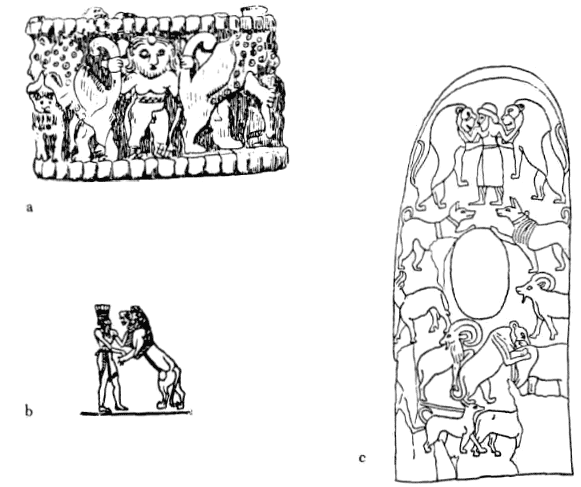
After daybreak, Gilgamesh traversed a mountain pass. In the distance below, he saw a body of water, like a vast lake, "driven by long winds." In the plain adjoining the inland sea he could see a city "closed-up about"—a city surrounded by a wall. There, "the temple to Sin was dedicated."
Outside the city, "close by the low-lying sea," Gilgamesh saw an inn. As he approached, he saw the "Ale-woman, Siduri." She was holding "a jug (of ale), a bowl of golden porridge." But as she saw Gilgamesh, she was frightened by his appearance:
"He is clad in skins ... his belly is shrunk ... his face is like a wayfarer from afar." Understandably, "as the ale-woman saw him, she locked the door, she barred the gate."
With great effort, Gilgamesh convinced her of his true identity and good intentions, telling her of his adventures and quest.
After Siduri let him rest, eat and drink, Gilgamesh was eager to continue. What is the best way to the Land of Living? he asked Siduri. Must he circle the sea and wind his way through the desolate mountains—or could he take a shortcut across the body of water?
Now ale-woman, which is the way...
What are its markers?
Give me, O give me its markers!
Suitably, by the sea I will go across;
Otherwise, by the wilderness my course will be.
The choice, it turned out, was not that simple;
for the sea he saw was the "Sea of Death":
The ale-woman said to him, to Gilgamesh:
"The sea, Gilgamesh, it is impossible to cross
From days of long ago,
no one arrived from across the sea.
Valiant Shamash did cross the sea,
but other than Shamash, who can cross it?
Toilsome is the crossing,
desolate is its way;
Barren are the Waters of Death
which it encloses
How then, Gilgamesh, wouldst thou cross the sea?
As Gilgamesh remained silent, Siduri spoke up again, revealing to him that there might be, after all, a way to cross the Sea of the Waters of Death:
Gilgamesh,
There is Urshanabi, boatman of Utnapishtim.
With him are tilings that float,
in the woods he picks the things that bind together.
Go, let he thy face behold.
If it be suitable, with thee he shall cross;
If it be not suitable, draw thou back.
Following her directions, Gilgamesh found Urshanabi the boatman. After much questioning as to who he was, how he had come hither, and where he was going, he was found worthy of the boatman's services. Using longpoles, they moved the raft forward. In three days, "a run of a month and fifteen days"—a forty-five day journey overland—"they left behind." He arrived at TIL.MUN—"The Land of the Living."
Whereto shall he go now? Gilgamesh wondered. You have to reach a mountain, Urshanabi answered; "the name of the mountain is Mashu."
The instructions given by Urshanabi are available to us from the Hittite version of the Epic, fragments of which were found in Boghazkoy and other Hittite sites. From those fragments (as put together by Johannes Friedrich: Die hethitischen Bruchstukes des Gilgamesh-Epos),we learn that Gilgamesh was told to reach and follow "a regular way"which leads toward "the Great Sea, which is far away." He was to lookfor two stone columns or "markers" which, Urshanabi vouched, "to thedestination always bring me." There he had to turn and reach a townnamed Itla, sacred to the God whom the Hittites called Ullu-Yah ("He of the Peaks"?). He had to obtain that God's blessing before he could go farther.
Following the directions, Gilgamesh did arrive at Itla. In the distance, the Great Sea could apparently be seen. There, Gilgamesh ate and drank, washed and made himself once again presentable as befits a king. There, Shamash once again came to his aid, advising him to make offerings to Ulluyah. Taking Gilgamesh before the Great God (Fig. 70), he urged Ulluyah: Accept his offerings, "grant him life." But Kumarbi, another God well known from Hittite tales, strongly objected: Immortality cannot be granted to Gilgamesh, he said.
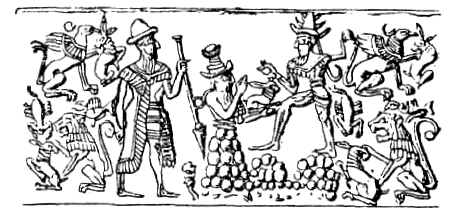
Fig. 70
Realizing, it appears, that he would not be granted a Shem, Gilgamesh settled for second-best: Could he, at least, meet his forefather Utnapishtim? As the Gods delayed their decision, Gilgamesh (with the connivance of Shamash?) left town and started to advance toward Mount Mashu, stopping each day to offer sacrifices to Ulluyah.
After six days, he came unto the Mount; it was indeed the Place of the Shems:
The name of the Mountain is Mashu.
At the mountain of Mashu he arrived;
Where daily the Shems he watched
As they depart and come in.
The Mount's functions required it to be connected both to the distant heavens and to the far reaches of Earth:
On high, to the Celestial Band
it is connected;
Below,
to the Lower World it is bound.
There was a way to go inside the Mount; but the entrance, the "gate," was closely guarded:
Rocket-men guard its gate.
Their terror is awesome, their glance is death.
Their dreaded spotlight sweeps the mountains.
They watch over Shamashas he ascends and descends.
(Depictions have been found showing winged beings or divine bull-men operating a circular beaming device mounted on a post; they could well be ancient illustrations of the "dreaded spotlight that sweeps the mountains"— Fig. 71a, b, c.)
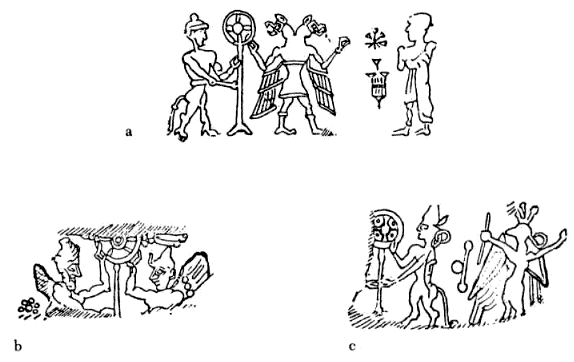
Fig.71
"When Gilgamesh beheld the terrible glowing, his face he shielded; regaining his composure, he approached them."
When the Rocketman saw that the dreaded ray affected Gilgamesh only momentarily, he shouted to his partner:
"He who comes, of the flesh of the Gods is his body!"
The rays, it appears, could stun or kill humans—but were harmless to the Gods.
Allowed to approach, Gilgamesh was asked to identify himself and account for his presence in the restricted area. Describing his partly divine origins, he explained that he had come "in search of Life." He wished, he said, to meet his forefather Utnapishtim:
On account of Utnapishtim, my forefather,
have I come—
He who the congregation of the Gods had joined.
About Death and Life I wish to ask him.
"Never was this achieved by a mortal," the two guards said. Undaunted, Gilgamesh invoked Shamash and explained that he was two-thirds God. What happened next is unknown, due to breaks in the tablet; but at last the Rocketmen informed Gilgamesh that permission was granted:
"The gate of the Mount is open to thee!"
(The "Gateway to Heaven" was a frequent motif on Near Eastern cylinder seals, depicting it as a winged, ladder-like gateway leading to the Tree of Life. It was sometimes guarded by Serpents—Fig. 72).
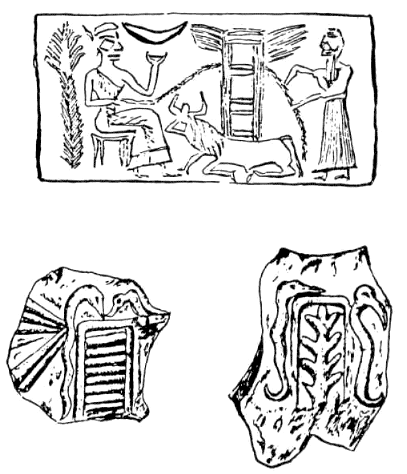
Fig. 72
Gilgamesh went in, following the "path taken by Shamash." His journey lasted twelve beru (double-hours); through most of it "he could see nothing ahead or behind"; perhaps he was blindfolded, for the text stresses that "for him, light there was none." In the eighth double-hour, he screamed with fear; in the ninth, "he felt a north wind fanning his face." "When eleven beru he attained, dawn was breaking." Finally, at the end of the twelfth double-hour, "in brightness he resided."
He could see again, and what he saw was astounding. He saw "an enclosure as of the Gods," wherein there "grew" a garden made up entirely of precious stones! The magnificence of the place comes through the mutilated ancient lines:
As its fruit it carries carnelians,
its vines too beautiful to behold.
The foliage is of lapis-lazuli;
And grapes, too lush to look at,
of... stones are made ...
Its ... of white stones ...
In its waters, pure reeds ... of sasu-stones;
Like a Tree ofLife and a Treeof...
that of An-Gug stones are made ...
On and on the description went. Thrilled and amazed, Gilgamesh walked about the garden. He was clearly in a simulated "Garden of Eden!"
What happened next is still unknown, for an entire column of the ninth tablet is too mutilated to be legible. Either in the artificial garden, or somewhere else, Gilgamesh finally encountered Utnapishtim. His first reaction on seeing a man from "days of yore" was to observe how much they looked alike:
Gilgamesh said to him,
to Utnapishtim "The Far-away":
"As I look upon thee, Utnapishtim,
Thou are not different at all;
evenas I art thou..."
Then Gilgamesh came straight to the point:
Tell me,
How joinest thou the congregation of the Gods in thy quest for Life?
In answer to this question, Utnapishtim said to Gilgamesh:
"I will reveal to thee, Gilgamesh, a hidden matter; a secret of the Gods I will tell thee."
The secret was the Tale of the Deluge: How when he,Utnapishtim, was theruler of Shuruppak and the Gods resolved to let the Deluge annihilate Mankind, Enki secretly instructed him to build a special submersible vessel, and take aboard his family "and the seed of all living things."
A navigator provided by Enki directed the vessel to Mount Ararat. As the waters began to subside, he left the vessel to offer sacrifices. The Gods and Goddesses—who circled Earth in their spacecraft while it was inundated— also landed on Mount Ararat, savoring the roasting meat. Finally, Enlil too landed, and broke into a rage when he realized that in spite of the oath taken by all the Gods, Enki enabled Mankind to survive.
But when his anger subsided, Enlil saw the merit of such survival; it was then, Utnapishtim continued to recount, that Enlil granted him everlasting life:
Thereupon, Enlil went aboard the ship.
Holding me by the hand, he took me aboard.
He took my wife aboard,
and made her kneel by my side.
Standing between us,
he touched our foreheads to bless us:
"Hitherto, Utnapishtim has been human;
Henceforth, Utnapishtim and his wife
like Gods shall be unto us.
Far away shall the man Utnapishtim reside,
at the mouth of the water-streams."
And so it came to pass, Utnapishtim concluded, that he was taken to the Faraway Abode, to live among the Gods. But how could this be achieved for Gilgamesh?
"But now, who will for thy sake call the Gods to Assembly, that the Life which thou seekest thou mayest find?"
On hearing the tale, and realizing that it is only the Gods, in assembly, who can decree eternal life and that he, on his own, could not attain it— Gilgamesh fainted. For six days and seven nights he was totally knocked out. Sarcastically, Utnapishtim said to his wife: "Behold this hero who seeks Life; from mere sleep as mist he dissolves!" Throughout his sleep, they attended to Gilgamesh, to keep him alive,
"that he may return safe on the way by which he came, that through the gate by which he entered he may return to his land."
Urshanabi the boatman was called to take Gilgamesh back. But at the last moment, when Gilgamesh was ready to leave, Utnapishtim disclosed to Gilgamesh yet another secret. Though he could not avoid death, he told him, there was a way to postpone it. He could do this by obtaining the secret plant which the Gods themselves eat, to keep Forever Young!
Utnapishtim said to him, to Gilgamesh:
"Thou hast come hither, toiling and straining. What shall I give thee,
that thou mayest return to thy land? I will disclose, O Gilgamesh, a hidden thing;
A secret of the Gods I will tell thee: A plant there is,
like a prickly berrybush is its root. Its thorns are like a brier vine's,
thine hands they will prick.If thine hands obtain the plant,New Life thou wilt find."
The plant, we learn from what followed, grew underwater:
No sooner had Gilgamesh heard this, than he opened the water-pipe. He tied heavy stones to his feet; They pulled him down into the deep; He saw then the plant. He took the plant, though it pricked his hands. He cut the heavy stones from his feet; The second cast him back where he came from.
Going back with Urshanabi, Gilgamesh triumphantly said to him:
Urshanabi,
This plant is of all plants unique:
By it a man can regain his full vigor!I
will take it to ramparted Uruk,
there the plant to cut and eat.
Let its name be called
"Man Becomes Young in Old Age!"
Of this plant I shall eat,
and to my youthful state shall I return.
A Sumerian cylinder seal, from circa 1700 B.C., which illustrated scenes from the epic tale, shows (at left) a half-naked and unkempt Gilgamesh battling the two lions; on the right, Gilgamesh holds up to Urshanabi the plant of everlasting youth. A God, in the center, holds an unusual spiral tool or weapon (Fig. 73).
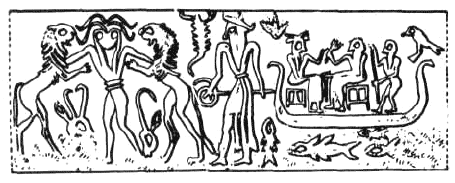
Fig. 73
But Fate, as with all those who in the millennia and centuries that followed went in the search of the Plant of Youth, intervened.
As Gilgamesh and Urshanabi "prepared for the night, Gilgamesh saw a well whose water was cool. He went down to it to bathe in the water."
Then calamity struck:
"A snake sniffed the fragrance of the plant. It came and carried off the plant. ..."
Thereupon Gilgamesh sits down and weeps, his tears running down his face.
He took the hand of Urshanabi, the boatman.
"For whom," (he asked) "have my hands toiled?
For whom is spent the blood of my heart?
For myself, I have not obtained the boon;
for a serpent a boon I affected. ..."
Yet another Sumerian seal illustrates the epic's tragic end: the winged gateway in the background, the boat navigated by Urshanabi, and Gilgamesh struggling with the serpent. Not having found Immortality, he is now pursued by the Angel of Death (Fig. 74).
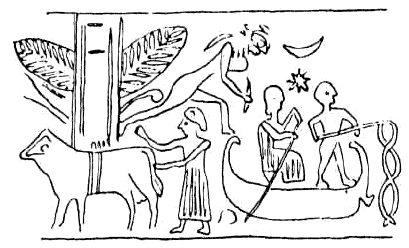
Fig. 74
And so it was, that for generations thereafter, scribes copied and translated, poets recited, and storytellers related, the tale of the first futile Search for Immortality, the epic tale of Gilgamesh. This is how it began:
Let me make known to the country
Him who the Tunnel has seen;
Of him who knows the seas,
let me the full story tell.
He has visited the...(?) as well,
The hidden from wisdom, all things ...
Secret things he has seen,
what is hidden from man he found out.
He even brought tidings
of the time before the Deluge.
He also took the distant journey,
wearisome and under difficulties.
He returned, and upon a stone column
all his toil he engraved.
And this, according to the Sumerian King Lists, is how it all ended:
The divine Gilgamesh, whose father was a human, a high priest of the temple precinct, ruled 126 years. Ur-lugal, son of Gilgamesh, ruled after him.